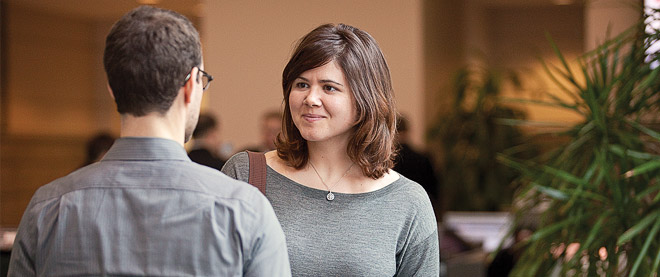Job interview? Here are some hints
When they say… ‘Tell us about yourself,’ they don’t really mean it
Share
Gregg Blachford, director of career planning at McGill University, says the winning formula for job interviews is to “know yourself, know the employer, and make the match.”
Know yourself: This is what prevents you from falling into stream-of-consciousness mode when asked, “so… tell me about yourself.” Nobody wants to know where you grew up and nobody’s interested in where you graduated from—they already gleaned those details from your resumé. That approach is akin to trying to sell a vacuum cleaner by reading the instruction manual out loud. Instead, talk about what makes you different from the tens, if not hundreds, of other qualified recent grads. The secret here is the old literary adage, “show, don’t tell.” For example, telling your interviewers that you are “very organized,” says Blachford, will only elicit a vacant stare. Instead, offer an achievement: “When I was president of the economics club, I cut costs by reorganizing the archives.”
Another human-resources favourite question is: “What is your greatest weakness?” One way to dodge the greatest-weakness bullet is to talk about a shortcoming you’ve beaten. Mark Barry, vice-president of human resources at Earl’s Restaurants, says his favourite response came from a candidate who admitted to flunking calculus in university, but hired a tutor, took the class again, and passed. It showed resilience. He was hired.
Finally, make sure the “virtual you” is presentable. Google yourself to see what comes up. If you’ve left an embarrassing digital trail, the Wall Street Journal suggests creating new appropriate content like a LinkedIn account or blog that will bury the drunken pictures.
Know the employer: Tailor the message to the audience. Mary Giamos, a career consultant at the University of Toronto, suggests listing what you think the employer needs and listing what you bring to the table—both skills and examples. Filling out that list requires multiple visits to the company’s website and reading the relevant media coverage. The exercise will prepare you for the most common interview wrap-up question: “So… do you have any questions about the company?” Your answer will reveal how much you know about the potential employer—and consequently, how interested you are in working there. In the fall, M.B.A. candidate Kelly Rosin, of York University’s Schulich School of Business, did just that. Before she sat down for a job interview with food giant General Mills, she studied the company’s ads, read a stack of reports on the industry, and even made a trip to the supermarket to compare the company’s products with competitors’. She beat out 70 other applicants from Schulich alone.
Make the match: Even if you know what you want to say, “there’s definitely value to saying it out loud,” says Giamos. Rehearsing will give you confidence and dramatically lower the chance of stuttering when the interviewer’s eyes burn into you. Practising in front of the mirror or with another person is also a good way to become aware of your most fastidious habits. Stephanie Robins, a McGill alum with an M.Sc. in experimental medicine, says practising taught her not to deviate from the interview’s focus with small talk.
Another option is recording yourself on a digital camera, which is especially useful training for video interviews, says Randy Bitting, CEO and co-founder of InterviewStream.com. The first rule of video etiquette, says Bitting, is to stare at the camera. If you look at the screen instead, you won’t be making eye contact with the interviewer. Second, clean up the clutter behind you. Third, quit all other programs running on your computer—a chat message from FunnyBunny86xx popping up in the middle of a video interview is like an annoying ringtone during an in-person meeting. But most importantly, if you end up doing a video interview, Bitting says to wear pants. “Some people out there only put on a shirt and tie and still have their pajama pants on beneath.”
